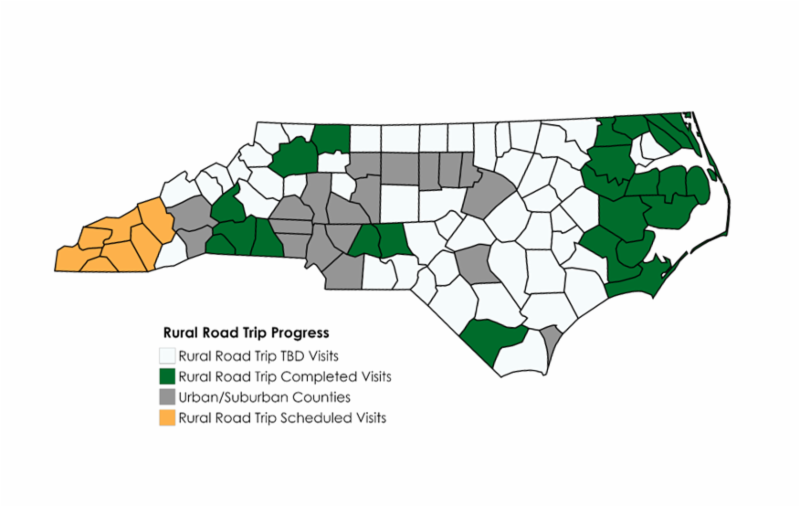 |
|
SEE HOW THE BUDGET STACKS UP &
WHERE THE DATA FALLS
FOR RURAL NORTH CAROLINA
|
School is out, the temperature is up, and the pace is quick on the advocacy front in June. Before diving into the pool, dive into this month's Rural Counts newsletter to get up-to-the-minute info about state and federal policy affecting rural North Carolina.
- Check out our recap of Rural Day - and see if our photographer caught you in the act of advocacy
- Review our summary of the North Carolina budget, released on Monday and up for final vote this week
- Dig deeply into our new county-level database on the economic imperative for closing the health insurance gap
- Act now to support federal innovations in career and technical education - up for a vote in Congress tomorrow
- Voice your support for rural-focused modifications to our state's economic development incentives program
- Sign up to attend our next round of community forums - part of our Rural Road Trip to all 80 rural counties
Then, turn off that cell phone and enjoy the summer sun!

John Coggin
Director of Advocacy
|
|

 RURAL DAY RECAP RURAL DAY RECAP
Relive the highlights of the state's first rural advocacy day
Over 300 people from 70 rural counties attended Rural Day this May. The two-day event was the first-ever statewide advocacy day focused on the economic development needs and opportunities in rural North Carolina.
We are deeply grateful to all those who attended - from the Smokey Mountains to the Outer Banks - and made the day a success. Over 30 speakers, including Governor Cooper, Senator Phil Berger, and Agriculture Commissioner Steve Troxler, addressed the crowd, and dozens of meetings were scheduled with House and Senate members, who heard loud and clear that #Rural Counts.
Interested in learning more about the media coverage of the event, exploring the social media excitement that caused us to trend on Twitter, and see if you were caught on camera by our photographer? Check out our
interactive online review of the event, and the recent
note of thanks from Rural Center President Patrick Woodie.
|
 |
 |
JONES STREET JOURNAL
Overview of the 2017-19 NC budget

After a month of negotiations, the NC General Assembly has released a compromise budget supported by the leadership of both the House and the Senate. The Senate voted on the two-year budget on Tuesday night, and the House is expected to vote today.
- Education: Creates a Needs-Based Public School Capital Fund for new school construction in Tier 1 and Tier 2 counties
- Education: Transfers the Apprenticeship NC program from Commerce to Community Colleges
- Health: Increases funding by $7.5 million per year for community health centers, rural health centers, free clinics, and other providers in rural and medically underserved communities
- Agriculture: Appropriates $250,000 to increase availability of fresh agricultural products in food deserts
- Transportation: Increases funding for Strategic Transportation Investments (STI) by $139.7 million in FY18 and by $180.5 million in FY19
- Transportation: Directs DOT to provide matching funds for regional transportation planning organizations for research and planning
- Hurricane Matthew: Provides $100 million for supplemental disaster recovery funding
There are also important items missing from the budget. Rural North Carolina faces a great need for broadband availability and affordability, for access to health insurance for hard-working citizens, and for job creation through the support of homegrown entrepreneurship and manufacturing. This current budget does not rise to any of these challenges, but the Rural Center is committed to working with our state leaders over the coming months and years to find solutions to meet the scale of these needs.
Want to dig deeper into the many provisions of the state budget without reading all 500 pages?
Review our comprehensive analysis of the items relating to each of the 10 Rural Counts strategies. And be on the lookout for a fuller analysis of the budget and this year's session of the General Assembly, coming soon from the Rural Center.
Bill Tracker
With the budget settled, only a few additional bills will be considered and passed by the General Assembly this session. Keep up with bills filed and still in play using our Bill Tracker.
Continued Updates
Want to learn about opportunities to act on issues that matter to you?
Sign up today as a Rural Counts advocate and let us know the areas where you want to help.
|
 |
 |

 ACT NOW ACT NOW
Call to Support the Career & Tech Readiness Bill
The Rural Center encourages you to call your Representative TODAY to support the Strengthening Career and Technical Education (CTE) for the 21st Century Act (HR 2353).
Rep. Virginia Foxx
(NC-5), Chairwoman of the House Education and The Workforce Committee, expects to take to the House floor
the Strengthening Career and Technical Education (CTE) for the 21st Century Act (H.R. 2353),
recently approved in committee with bipartisan support.
The bill, which the Rural Center supports, reauthorizes the Carl Perkins Act programs to provide federal support to help prepare high school and community college students and close the skills gap. The bill empowers state and local community leaders by simplifying the application process for receiving federal funds and providing more flexibility to use federal resources to respond to changing education and economic needs.
For example, the bill increases the amount of federal funds states can set aside to assist eligible students in rural areas.
The bill also improves alignment with in-demand jobs by supporting innovative learning opportunities, building better community partners, and encouraging stronger engagement with employers.
In recent years, Congress enacted bipartisan reforms to improve K-12 education (Every Student Succeeds Act) and alter the nation's workforce development system (Workforce Innovation and Opportunity Act). But advances in technology and the growth of a global economy have dramatically changed the kinds of jobs that are available. Our community and technical colleges need the flexibility to develop the skills vital to competing in today's workplaces.
|

 ACT NOW ACT NOW
Support rural economic development incentives
The state budget is currently getting the most attention on the state level, but there are several other bills under consideration at the legislature that, if passed this session, will have great impact on rural North Carolina.
HB795, Economic Development Incentives Modernizations, is one of these bills.
The Rural Center supports these important improvements to the Job Development Investment Grant (JDIG) program and the Economic Tier System, which ranks each county based on economic distress and helps determine the counties in most need of economic development incentives. We encourage you to support HB795's passage and to let your representative know that you support it.
HB795 includes several key components that would better support our state's rural communities, without being punitive to urban areas.
- Improves accuracy of the tier calculations to better measure economic distress
- Removes projects in Tier 1 counties from being subject to the JDIG cap
- Lowers the JDIG application fee for Tier 1 and 2 counties
- Expands Utility Fund usage to include retaining jobs in Tier 1 and 2 counties
- Modifies High-Yield Project criteria to make projects more attainable for rural counties
- Extends JDIG program sunset to 2025
JDIG is an important engine for economic development and job recruitment in North Carolina. The
Rural
Center believes the proposed changes to JDIG and the Economic Tier System that informs it will help our
rural counties better compete for these incentives and bring more jobs to their communities. For more information on this bill and its importance, see the recent
News & Observer
editorial
supporting the measure.
HB795 is currently before the
Finance Committee of the NC House of Representatives. If your representative serves on this committee, we encourage you to be in touch and communicate the importance of this legislation.
Not sure who represents you in the NC General Assembly? Find out
here!
|
 |
 POLICY UPDATE: HEALTH CARE REFORM POLICY UPDATE: HEALTH CARE REFORM
Updates from Congress and data for your county

The policy topic of the hour, both nationwide and in North Carolina, is health care. As members of Congress work to find a compromise solution for repeal and replace of the Affordable Care Act, advocates in North Carolina are working to find a way to close the health insurance gap in this state.
The Rural Center is working on both fronts to promote the needs of rural people in North Carolina. We recently sent a letter to Senator Burr and Senator Tillis expressing our desires for a health care bill that works for rural North Carolinians.
Last month we released a county-level database that shows the economic imperative for expanding health care coverage to the hard-working North Carolinians who need it the most.
We hope that you will take a moment to read through this overview, dig into your county's data, and let your leaders know that a strong health sector is a vital component to rural economic development.
American Health Care Act
Senate Republican leadership continue to meet to craft their bill to fix the Affordable Care Act. Discussions are focused on provisions to end the additional federal funds for Medicaid expansion, moderates recommending a seven-year phase-out while leadership is recommending three years. Senate leaders support allowing states to be exempt from the ACA rules on what an insurance plan must cover, known as essential health benefits, but not from the rules preventing people with pre-existing conditions from being charged more, known as community rating. Most recently, the Senate Parliamentarian has warned that a provision preventing tax credits from being used on insurance plans that cover abortion is unlikely to be allowed under Senate rules. If that provision is not allowed, the bill may lose conservative support. The Senate needs 51 votes to pass the legislation, so negotiations among Republican Senators are ongoing. A bill draft is expected to be released June 22, then scored by the Congressional Budget Office before taken to the floor before July 4 recess.
House Republican leaders worked closely with the White House to propose additional amendments to H.R. 1628 in order to secure the necessary Republican votes to move the bill forward. North Carolina Republican Representatives
George Holding (R-2),
Virginia Foxx (R-5),
Mark Walker (R-6),
David Rouzer (R-7),
Richard Hudson (R-8), R
obert Pittenger (R-9),
Patrick McHenry (R-10),
Mark Meadows (R-11), and
Ted Budd (R-13) voted for the bill. Representative
Walter Jones (R-3) joined Democrat Representatives
G.K. Butterfield (D-1),
David Price (D-4), and
Alma Adams (D-12) to oppose the measure. The Congressional Budget Office scored the House bill after the floor vote and estimated the measure would increase the number of uninsured by 23 million by 2026.
Meanwhile, insurance companies want assurances that they will continue to receive cost-sharing reduction payments from the federal government, estimated to be about $7 billion this year, to subsidize out-of-pocket costs for lower-income households. Insurers are facing imminent deadlines in many states to submit their preliminary premium requests and state whether they will stay in the market. In addition, they also face a June deadline to tell the federal government whether they will participate next year. Some states are considering their own reinsurance program to keep companies engaged. Some are offering tax relief to operate in rural counties.
Press reports state that Blue Cross and Blue Shield of NC is seeking an average rate hike of almost 23 percent because of the uncertainty around the cost-sharing payments vs. rate increases of less than 9 percent otherwise.
Should the Senate produce something significantly different from the House bill, the President and congressional leaders will face the choice of trying to reconcile the House and Senate versions or trying to jam the Senate bill through the House. There is still no guarantee of final passage of a health care bill to revise the Affordable Care Act.
Health Care Database
The NC Rural Center has launched a
new county-level database that lets users explore who would benefit from closing the
health insurance coverage gap, and the possible economic impact it could have for the state.
It is estimated that nearly 500,000 North Carolinians fall into the coverage gap, meaning they are either ineligible for Medicaid or earn too much to qualify for Medicaid but too little to pay their insurance premiums in the marketplace.
The Rural Center's
database presents Census data on poverty and near-poverty populations and provides estimates on insurance coverage to explore who might benefit from Medicaid expansion. The
database also reviews the economic importance of the state's
health sector and the economic impact of closing the coverage gap for local economies.
Many individuals who fall into the coverage gap are part of the "working poor," the portion of the workforce who are actively employed but living day-to-day in a financially precarious position. They are individuals and families, friends and neighbors, who are only one lost paycheck or adverse
health event away from economic ruin.
The data visualization tool puts into context the economic impact the coverage gap has at the state and county level. By most current estimates for North Carolina, the
health
care
sector accounts for 590,275 jobs and nearly $7.6 billion in taxable wages.
By not providing help to those who have fallen into the coverage gap, the state will miss out on a potential 43,314 new jobs and more than $21 billion in state business activity.
The
data visualization tool is meant as the start of a public conversation about how the state can assist those individuals who are working and trying to create a better life for themselves and their families. There are various potential policy solutions to closing the health insurance gap; the Rural Center has not taken an official position on any particular solution and is prepared to support efforts to identify a policy that fits North Carolina. Regardless of the ultimate policy choice, the
Rural Center's data shows that closing the health insurance gap is an essential component for growing rural economics, creating new jobs, and securing a high quality of life for our citizens.
|
 |
 |

 RURAL ROAD TRIP UPDATE RURAL ROAD TRIP UPDATE
Next up: Southwestern NC
Now that the Rural Counts strategies are finalized and the program has been launched, the Rural Center has embarked on an 80-county tour of all the rural counties in North Carolina to listen to citizens and leaders discuss local perspectives on statewide issues.
Rural Center President Patrick Woodie and Advocacy Director John Coggin have visited 26 counties so far, hearing about local success stories in education, transportation, health care, and more. They have also gotten feedback about areas where rural communities most need to band together to amplify each other's voices on the rural economic development issues most important to us all.
Our next stops will be in the southwestern part of the state. Interested in participating? Sign up now by clicking the registration links below.
Southwestern Community College, Franklin
Tuesday, July 25
9:00 a.m.
Hayesville Courthouse, Hayesville
Tuesday, July 25
2:30 p.m.
Tri-County Community College, Marble
Wednesday, July 26
9:00 a.m.
Swain County Technology & Training Center, Bryson City
Wednesday, July 26
12:30 p.m.
Waiting for a meeting in your county? Contact
John Coggin to schedule a community forum in your town.
|
|
|
 |
ECONOMIC IMPACT OF HOSPITALS & HEALTH SYSTEMS IN NC
NC Hospital Association releases statewide report
Hospitals and health care systems are a vital economic force in North Carolina, according to a report released this week by RTI International and the North Carolina Hospital Association.
The Economic Impact of Hospitals and Health Systems in North Carolina
examines the multiple ways health care influences local economic development: creating local jobs and educating the future workforce, attracting and retaining business, and providing essential unreimbursed services to the community.
North Carolina's health care sector generated $22.4 billion in labor income and $37.8 billion in gross domestic product last year. Hospitals directly and indirectly support nearly 400,000 jobs, or nearly 8.7 percent of total employment across the state. Using an economic multiplier, the report estimates that each job in North Carolina's hospital sector represents 2.44 jobs to the state, which is slightly higher than the national average reported by the American Hospital Association. The roughly 162,000 full-time employees working directly for a North Carolina hospital or health system account for a total of nearly 395,000 jobs not only in health care, but throughout all other businesses and industries in the state.
The report also highlights the community benefits hospitals and health systems provide through unreimbursed costs for services provided, through expenditures for unbilled community health improvement activities, and through investments in health professions education and research. In 2015, unreimbursed costs for services, including Medicare and Medicaid losses, totaled $3.6 billion. The full statewide report, including member community benefit impact profiles, and other supporting materials can be found on the
NCHA website
.
|
|
|
|
|